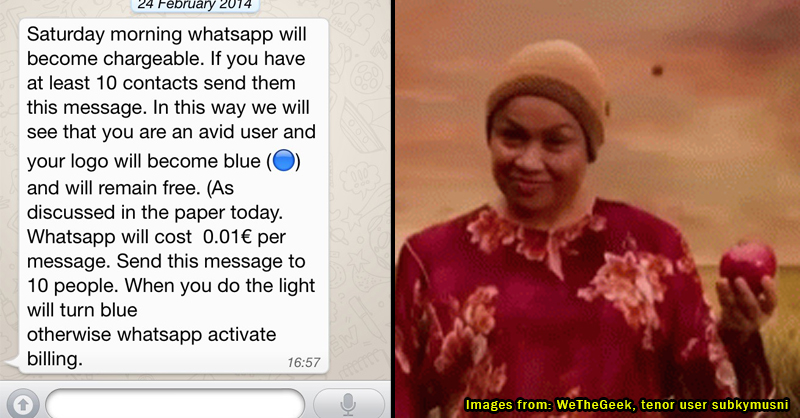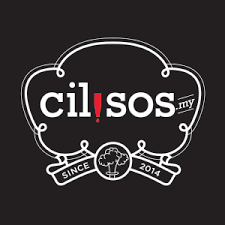4 questions to ask before forwarding that shady message your makcik sent you

- 267Shares
- Facebook238
- Twitter6
- LinkedIn6
- Email7
- WhatsApp10
We’ve all had those kinds of messages. You know, the messages claiming that X celebrity/government figure is part of a secret society hell-bent on depopulating the earth (which effectively means wiping out the source of their wealth, just saying). Or the ones that claim a magic treatment for a certain disease that has been ‘proven’ by a scientist somewhere (which millions of other scientists conveniently missed).

The one thing in common with most of these, is that they are usually sensationalized and emotion-inducing, hence why they are circulated regardless of their truth. In fact, this study by MIT showed that false news spreads six times faster than truth, likely because false news tends to be more novel and interesting.
This got us thinking: why not perform a small act of community service, and prepare a fast guide to help people filter out the noise from fact? And hey, maybe if this article is forwarded enough, you’d have to endure less message spam from your family Whatsapp groups. 😉
So here are 4 questions you should ask yourself when receiving a piece of new information. Thank us later.
1) Is the source reliable/valid?
As we can attest to, there actually isn’t a lot you can get away with when it comes to reporting information. Just ask our diligent readers, who are quick to jump on the slightest error in our stories (which we’re thankful for btw, keep it up!).

And whatever conspiracy theory you believe in, reputable news companies are reputable for a reason: the information they provide is usually current, accurate, and easily examinable.
But what are indicators of how reliable a source is? Well, a major one would be objectivity in reporting. If a source lacks hard bias, and doesn’t seem to be leaning towards any particular group or political ideology, chances are it’s a reliable source. Quite simply, how strongly are the writers’ own opinions or emotions reflected in their writing, and if any, how well-backed are these opinions? Are they experts in their field? Is the source trying to paint any particular party as the ‘bad guy’? If the writing feels more personal than impartial, it’s probably best to treat it with a pinch of salt.
Another would be to see who owns these sources. Often times this can tie into how they frame certain stories; for instance, don’t be surprised when a state-owned newspaper publishes pro-government news, and at the same time don’t expect them to be too critical of the government either. But definitely do pay attention the moment they are critical of the government, because they definitely wouldn’t do so without a good enough reason. Just an example, of course.
Which leads us into…
2) Is this being reported elsewhere?
Otherwise known as triangulation, checking to see if there are other reliable outlets reporting the same story and comparing them against each other is definitely a good idea.

Like we said earlier, you don’t get away with much nowadays, and if multiple news outlets are reporting something, chances are there might be something to it all. It also helps if multiple experts have said the same thing, and even then, it would be a good idea to check their credentials and affiliations, if any. It’s even better if you are able to contact these experts.
With that being said, don’t limit yourself to just the mainstream names; feel free to check out Twitter, or even FB/Insta Live to see if there’s anyone on the ground following the situation. Now, we’re not saying FB/Insta/Twitter are reliable sources on their own, but they could be, if used to corroborate something that’s already been published elsewhere, or vice versa.
3) Does the source provide references to their sources?
Here’s why we really like fact-checkers: unlike many of the chain messages being circulated, fact-checkers include references to their sources.

There’s a reason that they teach you to ‘check your referencing’ again and again in university: if it isn’t your idea, don’t steal it, basically. But if you would like to ‘steal’ it, make sure you credit whoever you got that information from. Academia takes this so seriously that you could be expelled for not citing your sources; in fact, Germany’s former education minister was removed from her post in 2013 for plagiarizing. So it’s not a play-play thing.
While citing sources isn’t really required when it comes to the wacky world of Whatsapp, it definitely does help boost the credibility of whatever information is being spread. This is because it affords us the opportunity to examine these sources for ourselves, and check the details to see if what is being reported indeed does match the content of those sources. It also allows us to see who originated these ideas, evaluate them, and if needed, test them.
And on that note…
4) Can I test the information?
No, we’re not saying everyone should become a guinea pig and drink that medicine cocktail that your Whatsapp uncle told you would cure diabetes forever.

What we mean is that whatever information is sent your way, it’s probably a good idea to ask as many questions as possible to attack whatever is being shared. And guess what, just by doing that, you’re already half-way to being a proper scientist, because, as any good scientist will tell you, no one attacks a scientist’s theories more than themselves; in fact, that’s actually the whole point of being a scientist.
For example, regarding that diabetes medicine cocktail we mentioned earlier, you could ask ‘who discovered it?’, ‘was this written as a joke?’, ‘what are its ingredients?’, ‘what are its effects?’, ‘does it do what it says it does?’, ‘do its risks outweigh its benefits?’, and many, many more. That’s the beauty of critical thinking: a curious mind has no limits.
While we realize that critical thinking culture is still a relatively new thing in Malaysia, there’s no harm in being skeptical when it comes to new or novel information. With that being said, it isn’t a bad thing to be prepared to change one’s mind when confronted with new, valid information; just be sure that information has been evaluated.
Oh, and when in doubt, the good ol’ Google is a great place to start.
Stay curious, stay playful, question everything
At the end of the day, we have to concede that humans don’t know everything. You could be wrong, we could be wrong, heck, even your Whatsapp uncle might be wrong, god forbid.

But what we definitely need more of is healthy doses of skepticism (within reason), willingness to ask questions, and keeping a constantly curious mind. So the next time you get a Whatsapp text urging you to forward it, ask yourself these questions, and save yourself the trouble of feeling anxious all the time, because chances are, it’s not the end of the world.
After all, it’s kinda boring to just accept the world as it is.
- 267Shares
- Facebook238
- Twitter6
- LinkedIn6
- Email7
- WhatsApp10



